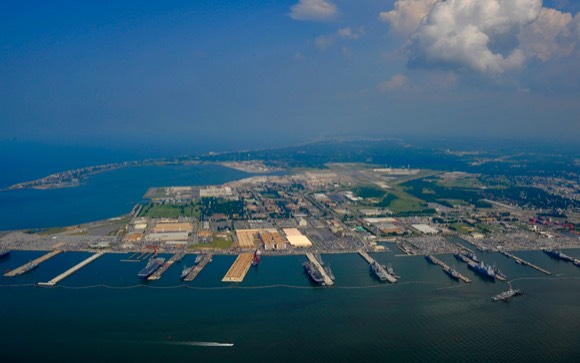The United States Navy has a big problem, one quite peculiar for such a huge seagoing organization: too much water. The problem isn’t the water itself; the Navy knows how to handle water. The problem is that global warming is putting too much water in the wrong places.

of those places is Naval Station Norfolk, a vast complex in southeastern Virginia whose 80,000 active-duty personnel make it the largest naval base on earth by population. The ships and aircraft stationed at Naval Station Norfolk have historically patrolled the Atlantic Ocean, the Indian Ocean, and the Mediterranean Sea. But in May of 2018, as part of the Trump administration’s new National Defense Strategy “to deter Russia and China,” the Navy announced that it would be expanding operations in the Arctic Ocean. Rising global temperatures were melting polar ice and opening sea lanes in the Arctic, enabling access to sizable deposits of natural resources, including oil. To counter anticipated Russian and Chinese claims on those resources, the Navy has reactivated its Second Fleet, which had been deactivated eight years ago by the Obama administration; it’s based at Naval Station Norfolk.
Norfolk’s ever-increasing vulnerability to flooding and what sea-level rise means long-term for the Navy concerns some high-ranking former naval officers, including the Navy’s former top oceanographer and a former expeditionary strike group commander based in Norfolk. Already, key access roads to the low-lying Naval Station Norfolk are occasionally submerged during high tides. By 2037, access roads will be underwater during high tides for 50 days of the year…
This article by DAVE LINDORFF is part of a global collaboration of more than 250 news outlets publishing climate change stories this week to strengthen coverage of the climate story. The project, called Covering Climate Now, is co-founded by The Nation and Columbia Journalism Review. To read the story in full, please go to: https://www.thenation.com/article/climate-military-navy-flooding/
